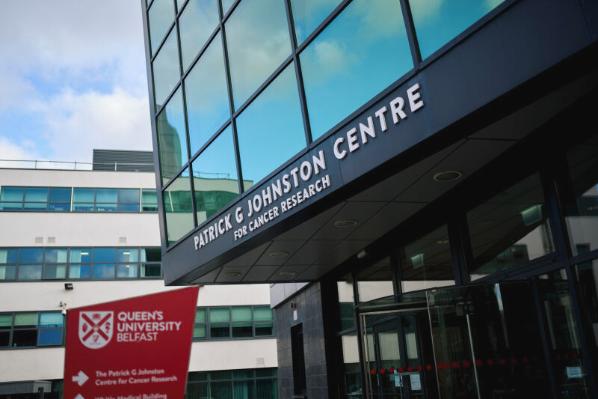DISCOVER CUTTING-EDGE THORACIC ONCOLOGY RESEARCH AT QUEEN'S
Queen's research in thoracic oncology involves a multidisciplinary approach, encompassing early detection, personalized treatment strategies, and understanding the underlying molecular mechanisms driving cancer progression.
Researchers at Queen's employ cutting-edge technologies including genomic analysis, imaging modalities, and immunotherapy to decipher the complexities of thoracic cancers. Through collaborative efforts between clinicians, scientists, and industry partners, Queen's aims to improve patient outcomes by developing innovative therapies, biomarkers for early diagnosis, and advancing our understanding of tumor biology, ultimately striving towards more effective treatments and better quality of life for patients.

LUNG CANCER
Researchers at Queen’s lead pioneering research in lung cancer, employing advanced technologies and collaborative efforts to understand its mechanisms and develop innovative treatments. Through early detection methods, personalized therapies, and targeted interventions, Queen's aims to improve patient outcomes and reduce the impact of this disease on individuals and communities worldwide.
- Autophagic secretion of HMGB1 from cancer-associated fibroblasts promotes metastatic potential of non-small cell lung cancer cells via NFκB signaling.
- Effects of Mesenchymal Stromal Cell-Derived Extracellular Vesicles in Lung Diseases Current Status and Future Perspectives.
- Isotoxic Intensity Modulated Radiation Therapy in Stage III Non-Small Cell Lung Cancer: A Feasibility Study

LUNG CANCER
- Cost-effectiveness of precision diagnostic testing for precision medicine approaches against non-small-cell lung cancer: a systematic review
- Practical implications to contemplate when considering radical therapy for stage III non-small-cell lung cancer
- Golgi Phosphoprotein 3 Confers Radioresistance via Stabilizing EGFR in Lung Adenocarcinoma
- Assessment of Variabilities in Lung-Contouring Methods on CBCT Preclinical Radiomics Outputs
- The HI-FIVE Trial: A Prospective Trial Using 4-Dimensional 68Ga Ventilation-Perfusion Positron Emission Tomography-Computed Tomography for Functional Lung Avoidance in Locally Advanced Non-small Cell Lung Cancer.
- Sinoatrial Node Radiation Dose and Atrial Fibrillation in Patients with Lung Cancer

OESOPHAGEAL CANCER
Ireland and the UK have the highest incidence of oesophageal adenocarcinoma worldwide. Researchers at Queen’s are actively researching oesophageal cancer, aiming to discover breakthroughs in detection and treatment.
- Identification of Src as a Therapeutic Target in Oesophageal Adenocarcinoma through Functional Genomic and High-Throughput Drug Screening Approaches
- Dual Erb B Inhibition in Oesophago-gastric Cancer (DEBIOC): A phase I dose escalating safety study and randomised dose expansion of AZD8931 in combination with oxaliplatin and capecitabine chemotherapy in patients with oesophagogastric adenocarcinoma
- Expanding oesophageal cancer research and care in eastern Africa
- Apoptosis and autophagy markers predict survival in neoadjuvant treated oesophageal adenocarcinoma patients
- Energy Metabolism, Metabolite, and Inflammatory Profiles in Human Ex Vivo Adipose Tissue Are Influenced by Obesity Status, Metabolic Dysfunction, and Treatment Regimes in Patients with Oesophageal Adenocarcinoma

TRANSLATIONAL CANCER RESEARCH
Queen's translational cancer research is dynamic, globally collaborative and encompasses various fronts in the battle against cancer, including genetics/epigenetic research, drug design and development, immunology research, radiotherapy techniques and the study of the tumor microenvironment. Through these multifaceted approaches, Queen's translational cancer research aims to pioneer innovative strategies for early detection, effective treatment, and ultimately, the eradication of cancer.



